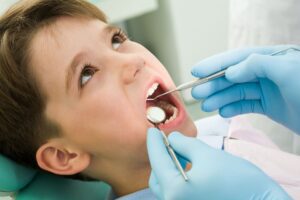If your child tells you they have a severe toothache, you know you need to call their dentist for an emergency dental check-up. However, some symptoms might be less extreme but could still signify a major dental concern.
Any changes in your child’s dental health should be shared with your dentist. Do not ignore these concerns or the young patient could suffer irreversible damage to their smile. Read on to find three minor dental issues that could point to larger problems that require prompt attention from a dentist.


Seek Urgent Dental Care for Minor Concerns
Tooth Sensitivity
If your child feels a jolt of pain in their tooth when eating sugary or cold foods, this could be a sign of tooth sensitivity. Though excruciating at the point of stimulation to the tooth, this pain is often intermittent. Even if your child does not feel this pain all the time, tooth pain of any kind is abnormal.
Tooth sensitivity occurs when the outer layer of enamel wears down, exposing the vulnerable interior of the tooth. The inner layers contain nerves that transmit pain signals to the brain when stimulated. So sensitivity pain points to structural damage in the tooth.
Tooth sensitivity can be a symptom of major dental problems too, like cavities. A dentist can evaluate the patient’s smile and offer treatment to restore dental health and alleviate pain. Do not delay this dental intervention or the issue can worsen.
Bleeding Gums
Sometimes, your child’s gums can bleed for acute reasons, such as harsh teeth-brushing techniques. But if the bleeding becomes chronic and is accompanied by swelling and soreness, it might be a symptom of gum disease.
This infection of the gum tissue is more common in adult dental patients. But children can be susceptible to this periodontal problem too. If left untreated, gum disease can progress to the teeth and the jaw. Then bacteria can eat away at these parts of the mouth, causing severe dental damage and even tooth loss.
You will need treatment from a dentist to get rid of this infection. It is easier to treat when diagnosed early, so do not ignore the symptoms of this issue. A dentist can screen for gum disease during a routine dentist appointment.
Chronic Bad Breath
Bad breath can affect the best of us, especially after eating a garlicky meal. But usually, brushing and flossing teeth will get rid of lingering food particles that cause bad-smelling breath.
If halitosis becomes chronic, remaining even after completing the oral hygiene routine, you might have another dental problem. Bad breath can develop if an individual has advanced gum disease or tooth decay. A dentist can check for these problems and offer the appropriate treatment.
Bad breath may also occur if a patient has an underlying medical issue. The dentist can spot the cause and relieve the symptoms after a dental check-up. Ignoring this problem can mean dental concerns will worsen.
